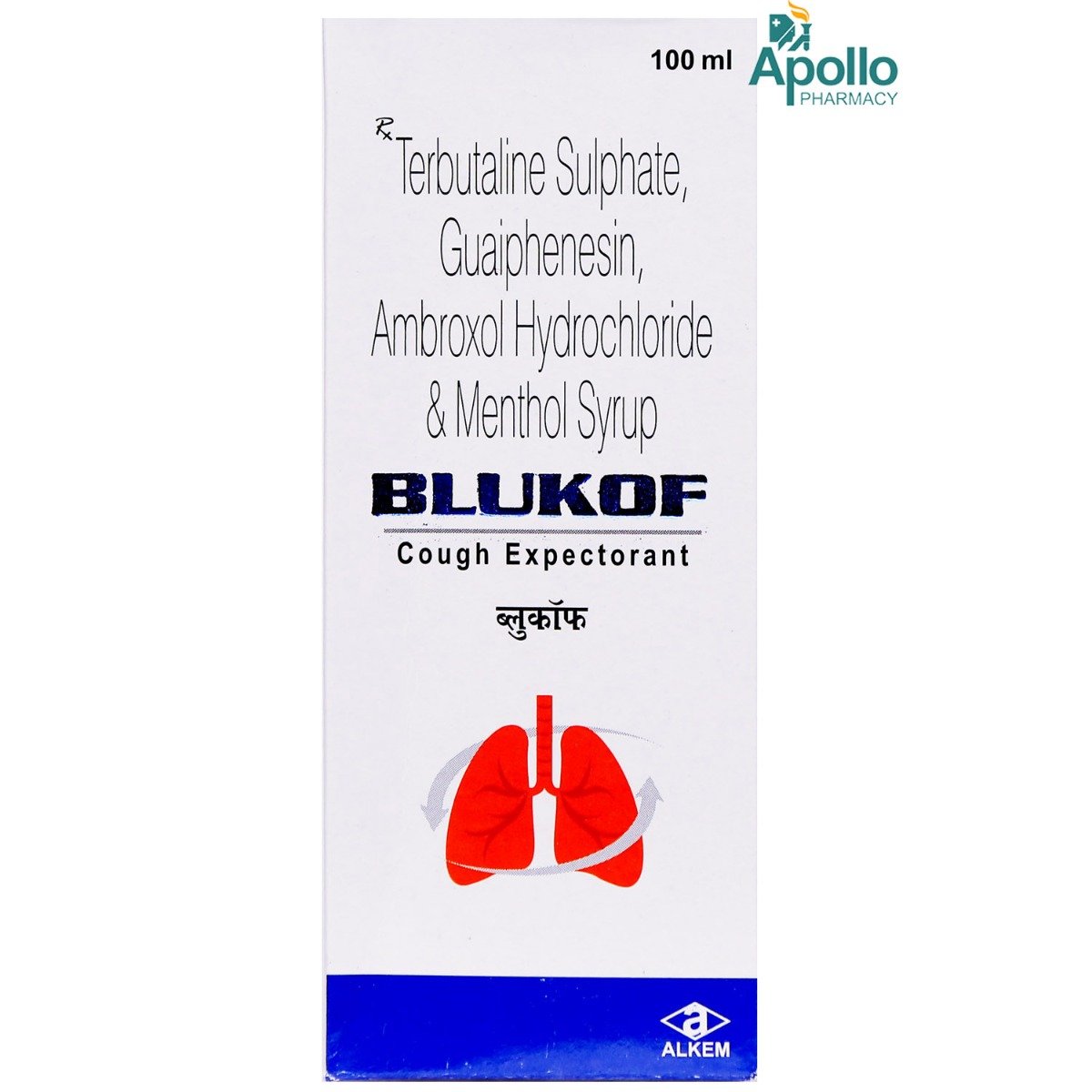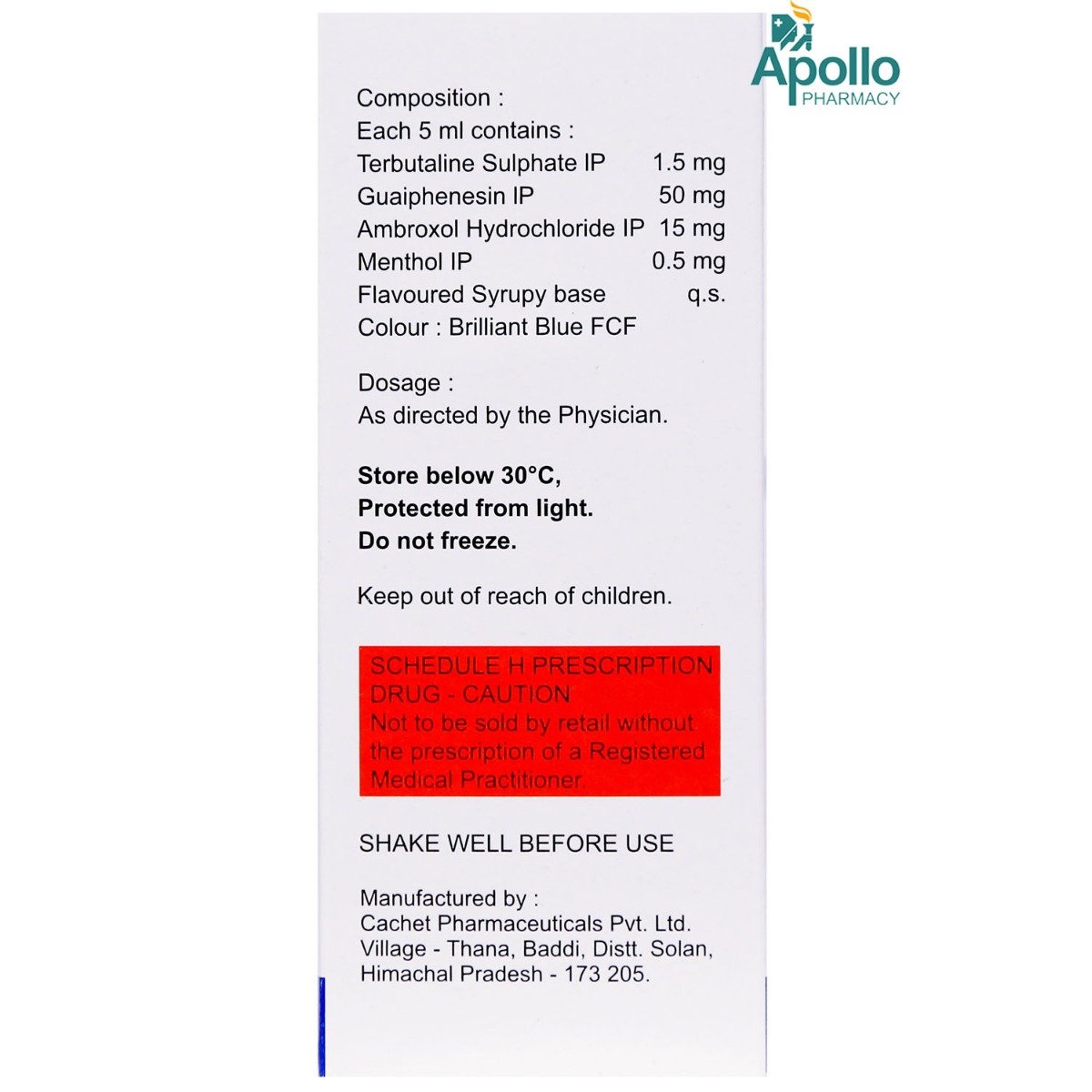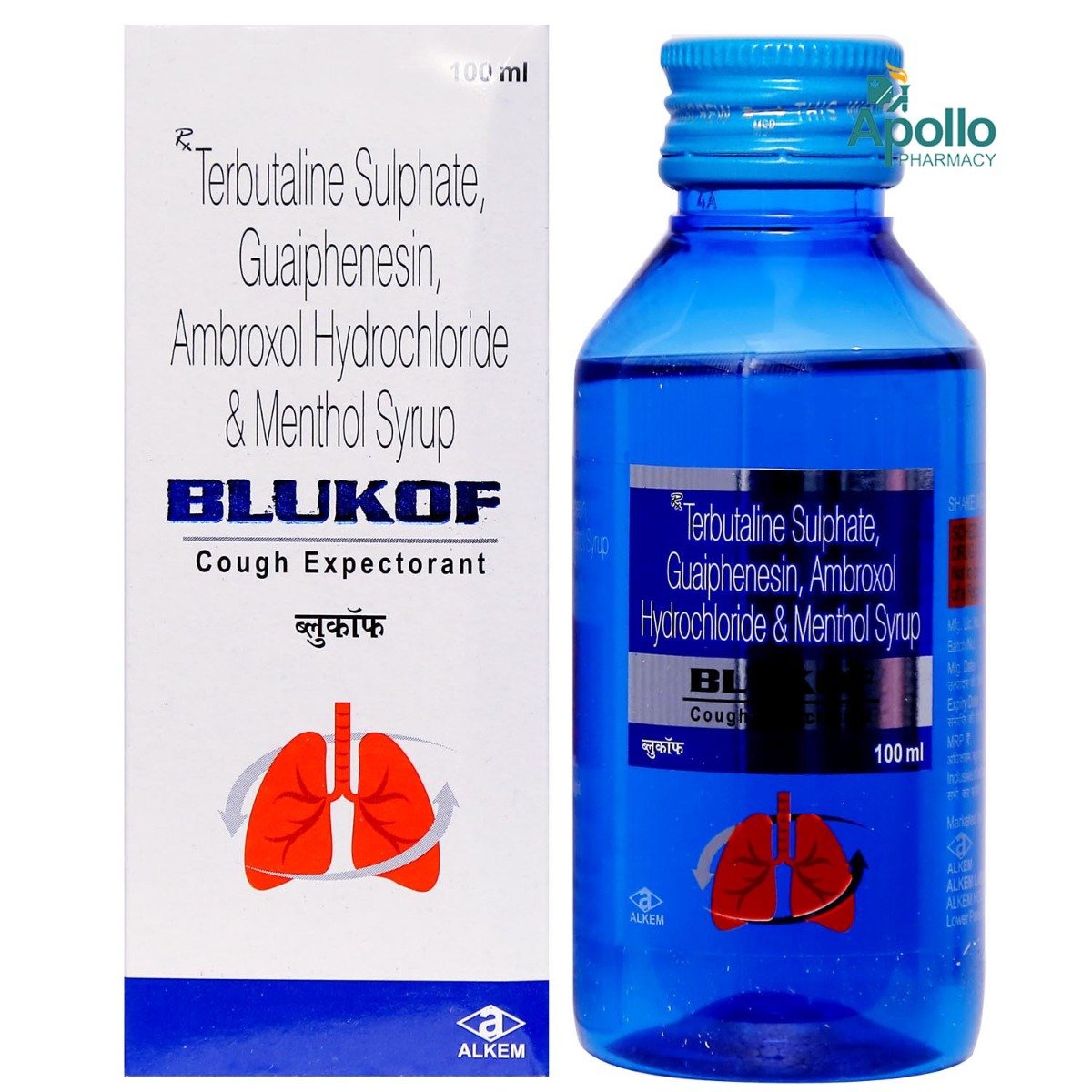Blukof Syrup 100 ml
MRP ₹109
(Inclusive of all Taxes)
₹16.4 Cashback (15%)
Provide Delivery Location
Online payment accepted
 Prescription drug
Prescription drugWhats That
Manufacturer/Marketer :
Consume Type :
Expires on or after :
Return Policy :
About Blukof Syrup
Blukof Syrup is a combination medication used to treat productive cough associated with bronchial asthma, bronchiectasis, chronic obstructive pulmonary diseases (COPD), bronchitis (inflammation of bronchial tubes), and emphysema (shortness of breath). Coughing (dry or productive) is a body's way of clearing irritants (like allergens, mucus or smoke) from airways and preventing infection.
Blukof Syrup consists of Ambroxol hydrochloride, Terbutaline sulphate, Guaiphenesin, and Menthol. Ambroxol hydrochloride is a mucolytic agent that makes sputum less viscous, making it easier to cough out. Terbutaline sulphate is a bronchodilator that works by widening and relaxing the airways of the lungs. Guaiphenesin is an expectorant which reduces the thickness/viscosity of bronchial secretions (phlegm) and increases mucus flow making it easier to cough. Menthol relieves throat irritation.
Your doctor will decide the dose and duration of the course based on the severity of your condition. In some cases, Blukof Syrup may cause common side effects like nausea, diarrhoea, vomiting, stomach discomfort, sweating, muscle cramps, dizziness, and headache. These side effects do not require medical attention and resolve over time. However, if the side effects are persistent, reach out to your doctor.
Let your doctor know if you have any allergic reactions to Blukof Syrup or any other medication. Inform your doctor if you have heart, liver, kidney diseases, stomach ulcers, seizures (fits), high blood pressure, thyroid disorders, diabetes, inflammation of air passages, lung disorders, and difficulty breathing before taking Blukof Syrup . Check with your doctor if you are pregnant or breastfeeding. Avoid alcohol while taking Blukof Syrup , since it can worsen side effects like dizziness and sleepiness.
Uses of Blukof Syrup
Directions for Use
Key Benefits
Blukof Syrup contains Ambroxol hydrochloride, Terbutaline sulphate, Guaiphenesin, and Menthol. Ambroxol hydrochloride is a mucolytic agent that makes sputum less viscous, making it easier to cough out. Terbutaline sulphate is a bronchodilator which works by widening and relaxing the airways (bronchi) of the lungs. Guaiphenesin is an expectorant that reduces the thickness/viscosity of bronchial secretions (phlegm) and increases mucus flow making it easier to cough. Menthol produces a sensation of coolness and relieves throat irritation.
Storage
- Notify your doctor immediately if you experience tremors or involuntary shaking after taking medication or adjusting your medication regimen.
- Your doctor may adjust your medication regimen or recommend alternative techniques like relaxation, meditation, or journaling to alleviate tremor symptoms.
- Your doctor may direct you to practice stress-reducing techniques, such as deep breathing exercises, yoga, or journaling.
- Regular physical activity, such as walking or jogging, can help reduce anxiety and alleviate tremor symptoms.
- Your doctor may recommend lifestyle changes, such as avoiding caffeine, getting enough sleep, and staying hydrated, to help manage tremors.
- Maintain regular follow-up appointments with your doctor to monitor tremor symptoms and adjust treatment plans as needed.
- Hydrate your body: Drink enough water to prevent dehydration and headaches.
- Calm Your Mind: Deep breathing and meditation can help you relax and relieve stress.
- Rest and Recharge: Sleep for 7-8 hours to reduce headache triggers.
- Take rest: lie down in a quiet, dark environment.
- Cold or warm compresses can help reduce tension.
- Stay Upright: Maintain good posture to keep symptoms from getting worse.
- To treat headaches naturally, try acupuncture or massage therapy.
- Over-the-counter pain relievers include acetaminophen and ibuprofen.
- Prescription Assistance: Speak with your doctor about more substantial drug alternatives.
- Severe Headaches: Seek emergency medical assistance for sudden, severe headaches.
- Frequent Headaches: If you get reoccurring headaches, consult your doctor.
- Headaches with Symptoms: Seek medical attention if your headaches include fever, disorientation, or weakness.
- Contact your doctor immediately if you're experiencing a fast heart rate, palpitations, or other heart-related symptoms. This is crucial to determine whether the symptoms are related to your medication.
- Your doctor may need to adjust your medication regimen to alleviate the fast heart rate symptoms. This could involve changing the medication, reducing the dosage, or adding new medications to counteract the side effects.
- Follow your doctor's advice on monitoring your heart rate and blood pressure. This will help track any changes and ensure your heart rate returns normal.
- If you experience severe symptoms such as chest pain, dizziness, or shortness of breath, seek immediate medical attention. These symptoms can indicate a more serious condition that requires prompt treatment.
- Avoid triggers like alcohol, caffeine, and energy drinks.
- Try relaxation techniques such as yoga, meditation, or deep breathing.
- Exercise regularly as it helps maintain heart health.
- Follow a nutritious and balanced diet.
- Gently massage the affected area using your hands or a massager.
- Light exercises such as walking or climbing stairs may help the muscles return to normal.
- Apply heat/ice to the affected area.
- Drink electrolyte-rich fluids.
- Exercise regularly and maintain a healthy weight.
- Manage cholesterol and blood pressure.
- Limit intake of caffeine and alcohol.
- Avoid vaping and tobacco smoke.
- Get enough sleep.
- Talk to your doctor about antiarrhythmic drugs or other medications to treat your condition.
Drug Warnings
Blukof Syrup should be used with caution in patients with heart, liver, kidney diseases, fits, stomach ulcers, high blood pressure, thyroid disorders, inflammation of air passages, lung disorders, and difficulty breathing. If you have diabetes, let your doctor know since Blukof Syrup may affect blood sugar levels. Using Blukof Syrup with painkillers like aspirin can damage the gastro mucosal barrier (protects the stomach from the attack of acid); hence Blukof Syrup should be cautiously administered in patients with a stomach ulcer. Pregnant and breastfeeding women should use Blukof Syrup with proper consultation and caution. Avoid consuming alcohol with Blukof Syrup as it could lead to increased drowsiness or dizziness. Do not drive if you feel sleepy or have an increased heart rate or shakiness after taking Blukof Syrup .
Drug-Drug Interactions
Drug-Drug Interactions
Login/Sign Up
-
How to manage the interaction:
Co-administration of Blukof Syrup 100 ml with Procarbazine can possibly result in an interaction, but it can be taken if your doctor has advised it. Do not discontinue any medications without first consulting your doctor.
Taking Blukof Syrup 100 ml with ceritinib can increase the risk of irregular heart rhythm.
How to manage the interaction:
Although there is a interaction between Ceritinib and Blukof Syrup 100 ml, you can take these medicines together if prescribed by your doctor. However, consult your doctor immediately if you experience symptoms such as dizziness, lightheadedness, fainting, shortness of breath, or heart palpitations. Do not stop using any medications without talking to a doctor.
Combining Blukof Syrup 100 ml and nilotinib can increase the risk of an irregular heart rhythm.
How to manage the interaction:
Taking Blukof Syrup 100 ml and nilotinib together can lead to an interaction, it can be taken if advised by your doctor. However, if you experience any symptoms like sudden dizziness, lightheadedness, fainting, shortness of breath, heart palpitations, diarrhea, or vomiting, contact your doctor immediately. Do not discontinue any medications without first consulting your doctor.
Taking Gatifloxacin and Blukof Syrup 100 ml can increase the risk or severity of irregular heart rhythms. The risk increases in patients with a history of heart illness or electrolyte imbalance.
How to manage the interaction:
Taking Gatifloxacin and Blukof Syrup 100 ml together can possibly result in an interaction, it can be taken if your doctor has advised it. However, if you experience sudden dizziness, lightheadedness, fainting, shortness of breath, chest pain or tightness, rapid heartbeat, or memory loss, contact a doctor immediately. Do not discontinue any medications without consulting a doctor.
Using Blukof Syrup 100 ml together with amisulpride can increase the risk of severe irregular heart rhythm.
How to manage the interaction:
Amisulpride and Blukof Syrup 100 ml can cause an interaction, but it can be taken if prescribed by a doctor. You should seek immediate medical attention if you develop sudden dizziness, lightheadedness, fainting, shortness of breath, or heart palpitations. Do not stop using any medications without talking to a doctor.
Co-administration of Labetalol and Blukof Syrup 100 ml together can decrease the medical benefits of both medications.
How to manage the interaction:
Although taking Labetalol and Blukof Syrup 100 ml together can result in an interaction, it can be taken if a doctor has prescribed it. Do not forget to inform the doctor if you have severe chronic obstructive pulmonary disease (COPD) or a history of asthma, as labetalol is often not advised in these conditions. Do not discontinue any medications without a doctor's advice.
Using sotalol together with Blukof Syrup 100 ml may reduce the benefits of both medications since they have opposing effects in the body.
How to manage the interaction:
Taking Sotalol with Blukof Syrup 100 ml together can result in an interaction, but it can be taken if a doctor has advised it. Do not stop using any medications without a doctor's advice.
Combining Tranylcypromine with Blukof Syrup 100 ml can increase the risk of high blood pressure.
How to manage the interaction:
Although taking Blukof Syrup 100 ml and Tranylcypromine together can evidently cause an interaction, it can be taken if your doctor has suggested it. If you take multiple medications that can raise your blood pressure, it may increase your risk of having high blood pressure while lying down. It's important to regularly check your blood pressure, especially when lying down or with your head elevated, and watch out for any signs of side effects. Do not stop using any medications without a doctor's advice.
Taking Carvedilol and Blukof Syrup 100 ml may reduce the beneficial effects of both medications.
How to manage the interaction:
There may be a possibility of interaction between Blukof Syrup 100 ml and Carvedilol, but it can be taken if prescribed by a doctor. Consult your doctor immediately if you experience shortness of breath, palpitations, or chest discomfort. Do not stop using any medications without a doctor's advice.
Using propranolol together with Blukof Syrup 100 ml may reduce the benefits of both medications, since they have opposing effects in the body. In addition, propranolol can sometimes cause breathing problems.
How to manage the interaction:
Although taking Propranolol together with Blukof Syrup 100 ml can possibly result in an interaction, they can be taken together if prescribed by your doctor. However, if you experience any unusual symptoms contact your doctor immediately. Do not stop using any medications without first talking to your doctor.
Drug-Food Interactions
Drug-Food Interactions
Login/Sign Up
Diet & Lifestyle Advise
- Quit smoking and avoid passive smoking. Smoking also reduces the effectiveness of the medicine.
- Drink warm fluids while you take Blukof Syrup to help loosen congestion and lubricate the throat.
- Eat a healthy diet and exercise regularly to strengthen your breathing muscles and boost your immune system.
- Learning breathing exercises will help you move more air in and out of your lungs.
Side Effects of Blukof Syrup
- Nausea
- Diarrhoea
- Vomiting
- Stomach discomfort
- Dizziness
- Headache
Habit Forming
Therapeutic Class
All Substitutes & Brand Comparisons
RX
Out of StockBlukof Junior Syrup 60 ml
Alkem Laboratories Ltd
₹63
(₹0.95/ 1ml)
3% CHEAPERRX
Out of StockBlucof Junior 60Ml Syp
Alkem Laboratories Ltd
₹151
(₹2.27/ 1ml)
131% COSTLIER
Author Details
We provide you with authentic, trustworthy and relevant information
Drug-Diseases Interactions
Drug-Diseases Interactions
Login/Sign Up
FAQs
Drug-Drug Interactions Checker List
- EPINEPHRINE
- OXYTOCIN
- DIGOXIN
- SAFINAMIDE
- RASAGILINE
- PROPRANOLOL
- ONDANSETRON
- PROMETHAZINE
- BUDESONIDE
- AMINOPHYLLINE
- FORMOTEROL
- FUROSEMIDE
Special Advise
Please consult your doctor if your cough persists for more than one week.
Disease/Condition Glossary
Cough: Coughing is the body's way of clearing irritants (like allergens, mucus or smoke) from airways and preventing infection. Coughs may be dry or productive. A productive cough (wet cough) brings up sputum (phlegm, mucus and other matter) from the lungs. A dry cough does not produce sputum/phlegm. Cough is commonly caused as a response to allergy or viral infection but coughing up mucus is possibly an indication of infection in the respiratory tract. If you are coughing thick, solid white mucus, you may have a bacterial infection in the airways. If the mucus is clear or light-coloured, you may have allergies or minor infections in the respiratory tract, and yellow or green mucus indicates a respiratory infection.

Have a query?
Alcohol
Safe if prescribed
Avoid consuming alcohol with Blukof Syrup as it could lead to increased drowsiness or dizziness.
Pregnancy
Consult your doctor
There are limited studies on how Blukof Syrup affects pregnancy. Please consult your doctor before using Blukof Syrup if you are pregnant or planning to conceive.
Breast Feeding
Consult your doctor
There is limited data on how Blukof Syrup affects breastfeeding. Please consult your doctor before starting Blukof Syrup if you are breastfeeding.
Driving
Safe if prescribed
Do not drive or operate machinery if you experience sleepiness, dizziness, increased/uneven heart rate and shakiness while using Blukof Syrup . This may affect your ability to drive. Seek medical attention if the symptoms persist longer.
Liver
Consult your doctor
Blukof Syrup should be used with caution in patients with liver diseases. Let your doctor know if you have any history of liver diseases or hepatic impairment. Your doctor will weigh the benefits and potential risks before prescribing Blukof Syrup .
Kidney
Consult your doctor
Blukof Syrup should be used with caution in patients with kidney diseases. Let your doctor know if you have any history of kidney diseases. Your doctor will weigh the benefits and potential risks before prescribing Blukof Syrup .
Children
Safe if prescribed
Blukof Syrup is not recommended for children less than two years of age. However, it can be given to children above two years of age if prescribed by the doctor.












_0.jpg?tr=q-85)
